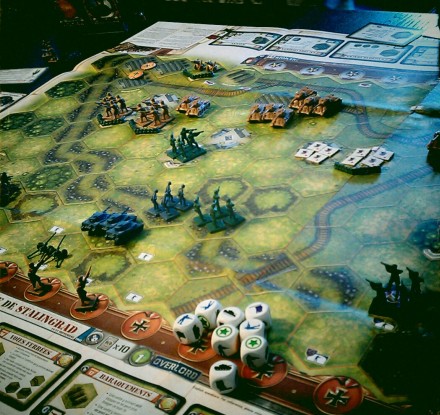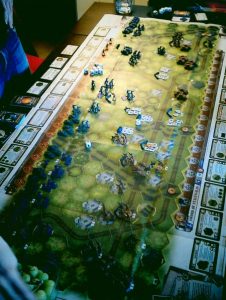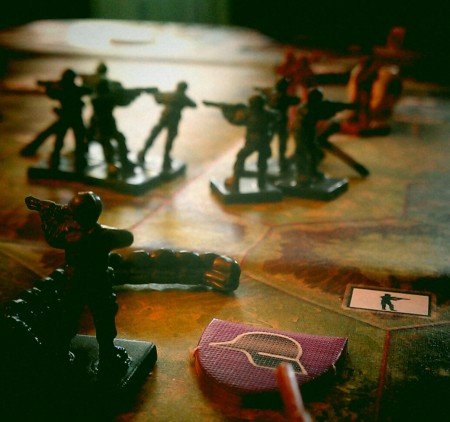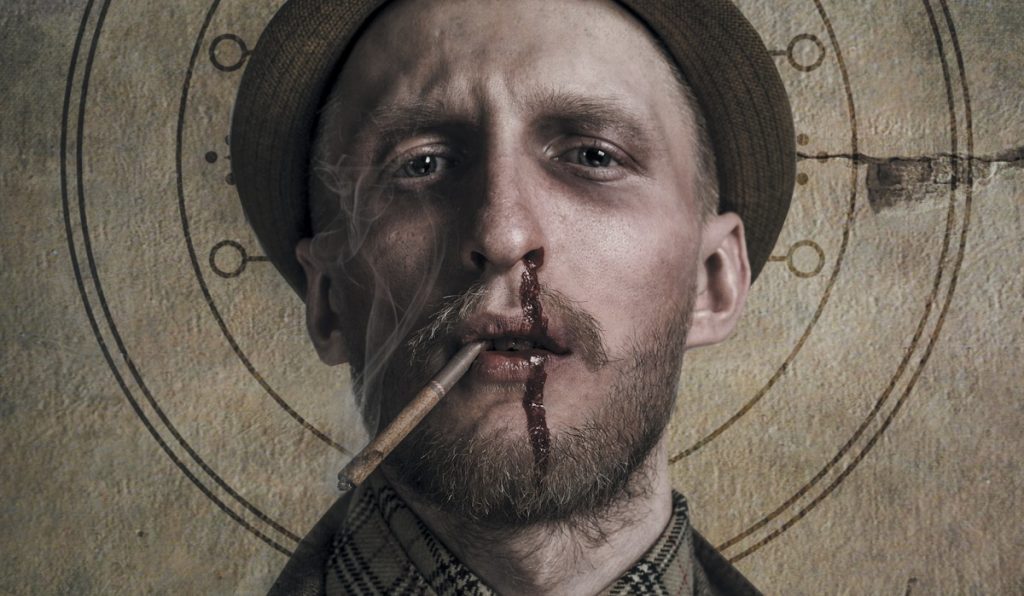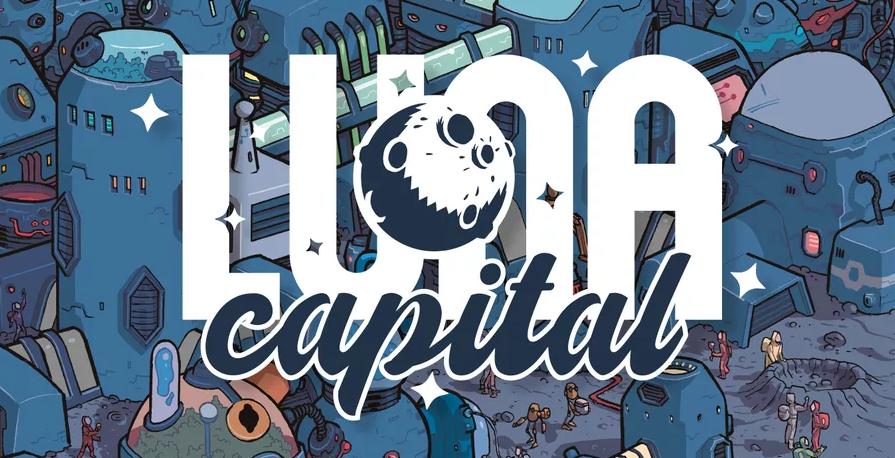Quinns: If you’ve watched episode 1 you’ll have seen Paul and myself getting a bit too excited about WW2 strategy game Memoir ‘44. It’s a two player game, but an expansion, Overlord, turns it into a team game where up to eight players can fight a battle that makes the original game look as pathetic as two consenting adults splashing water at one another in a bath.
Here’s an Overlord scenario in all of its unholy glory.
As you can see, it lengthens the battlefield. Cheeky! It also divides it into three fronts, each of which is supervised by one general from each side. So basically you’ve got three simultaneous, standard-sized matches of Memoir going on, except not only can units be sent wandering from one battle into another, you also win or lose as a whole. If one flank is crumpling like a failed soufflé, it’s everybody’s problem.
Most excitingly of all, the generals all answer to the fourth member of each team- the Commander in Chief. Those command cards you saw Paul squealing about in episode 1? The Commander in Chief is the only member of each team who holds a hand of them, and on each turn he’ll be distributing them among his generals, forcing them to execute assaults, dig their boys in or anything in between. In short, Overlord doesn’t just enlarge Memoir. It gives it a shot in the arm with a syringe full of drama.
Paul and I were the commanders in our game, me supervising Germans (again) and him the Russians in a climactic battle for Stalingrad that lasted three real-life hours, making it exactly three times as long as the average game of Memoir. But you found it stressful, didn’t you Paul?
Paul: Would you like to know why?
Quinns: Go on.
Paul: Well, as the Soviets I wasn’t always sure if I was just fighting you, or if I was fighting Soviet bureaucracy. Every turn, I had to choose the orders I was going to dole out for the next turn, as well as employ the orders I’d handed to myself the turn before. I was playing catch-up the whole time. It’s a horrid penalty for the Soviet player to suffer.
Quinns: I liked that rule. I thought it was really fun. At least you got a big, heavy-duty Soviet poker chip to put your command cards under. That rule didn’t genuinely impact your enjoyment of the game, did it?
Paul: Well, no, not really. Memoir is still a great game to play, but it definitely gives the Soviet player a particular challenge to contend with. And of course you think it’s fun, because it means you get to drive your tanks past my command tent while I’m still tied up on the phone to Moscow, desperately trying to get permission to SHOOT BACK AT YOU.
Quinns: WAR IS HELL. Let’s talk about Overlord itself, anyway.
Paul: I’m sorry, I was waiting to get PERMISSION FROM MOSCOW TO DO THAT. It’s okay, I’m calm. I’m alright now.
I think the first thing we should say about Overlord is that it’s absolutely enormous. It’s a feast for the eyes. It’s going to be one of the most exciting things you’ll do on your dinner table, and certainly way more worthy than a dreary Sunday roast. It makes your table an interesting piece of furniture once again. The sheer number of units and the scope of the battlefield make you feel like you really are fighting for a whole city, or at least a whole suburb. It’s lucky that you have a team to delegate orders to.
Quinns: Right. While you lot were all coming up the stairs I was hoping one of you might say “Wow” when you saw the game laid out on the table, but what actually happened was every one of you said “Wow” in succession as you all came filing in. That said, there’s a bit of intimidation that comes with that size, and everyone relying on everyone else. You had some trouble with Sanda being new to wargames and the occasional turn where it was in the rules that you couldn’t offer her advice, didn’t you?
Paul: Well, that’s again part of the fun, part of the challenge, but also another burden for the Commander-in-Chief. It’s in the rules that the commander can only talk to one general each turn. Sometimes, you desperately, desperately want those under you to perform very specific things, while other times you hope that they’ll understand that, based on what you just told one of their colleagues, they need to complete a maneuver themselves. Then, of course, there’s the horrible situation you find yourself in where you don’t actually have enough command cards to issue to each of your generals.
Quinns: Right. That was a side to being the Commander in Chief that really impressed me, just because it caught us both by surprise. Since we could only draw two new command cards each turn we both managed to erode our hands until we were picking our orders out of a hand of three command cards, instead of a hand of ten. Idiots! Although it did mean that the closing stages of the battle saw our generals pushing forward exhaustedly with whatever useless cards we had left, which made the battle feel even more believable.
Paul: War is hell. There you are, with an abundance of orders for one side of the battlefield, watching an enemy advance on the other side about which you can do nothing. Absolutely sod all. Oh God, it really is Memoir writ large.
Quinns: So, to clarify, you can play Overlord scenarios if yourself and a friend both have copies of Memoir ‘44, OR by buying the Overlord expansion and one of the three available scenario packs.
Paul: If you really enjoy Memoir, and want to get more people involved, buy this expansion. It turns Memoir into something grander and also something more social. It spreads the love.
Quinns: Do you think it’s worth dropping a total of £75 or whatever it is just to play Overlord missions? I’d say almost, actually. I can’t think of another game in existence that’s this epic while being this accessible.
Paul: I’d second that, but the price is epic to go with it. You’ll need enough friends to populate both sides of the board and those friends will also have to be people who will want to return to the game again and again.
Quinns: My team won, by the way, readers. Crumpled up Paul’s left flank like a paper bag and then quickly swept up to claim an undefended hill in the centre, ending the game.
Paul: You mean, your general took my left flank and your other general took a hill.
Quinns: Shut up. My general took your mum’s hill last night, if you know what I mean.
Paul: I don’t know what you mean.
Quinns: Alright.

